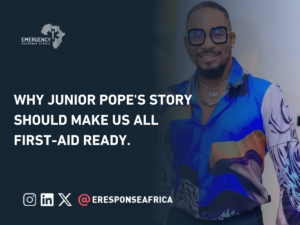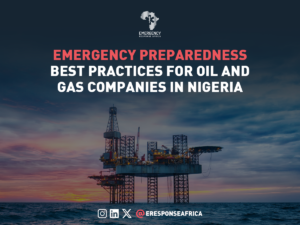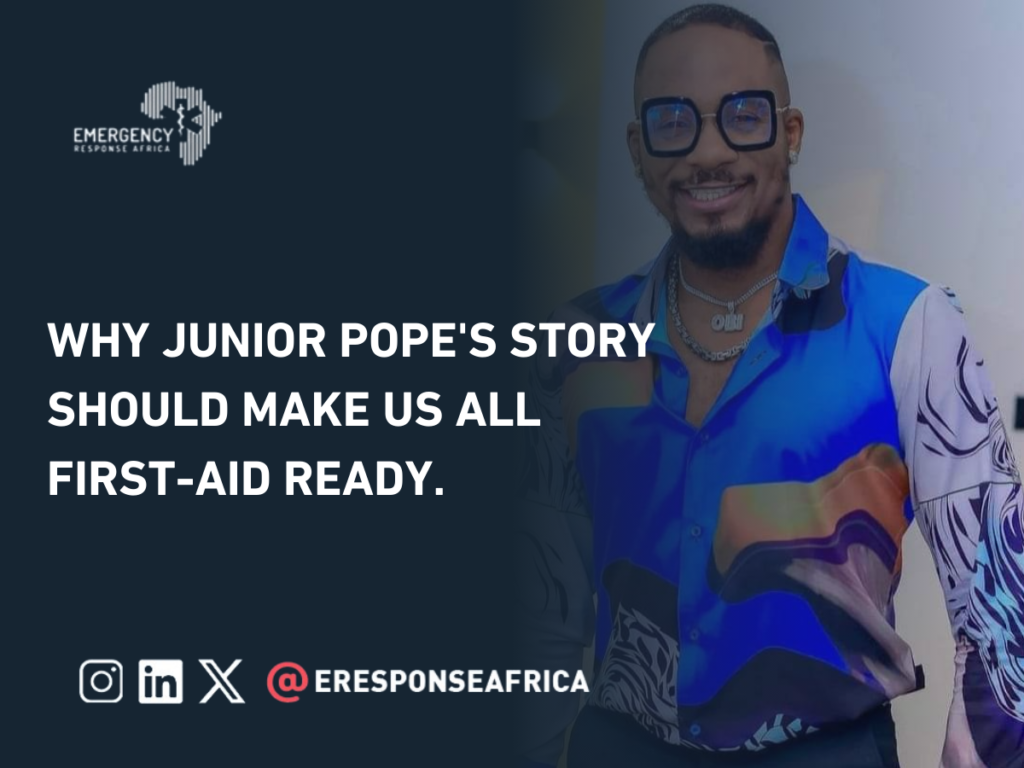The big shock in the Nigerian film industry, popularly called Nollywood, was recent. The character actor Junior Pope, who was widely known for his numerous portrayals of charismatic figures, passed on after being involved in a motorboat accident.
The recent tragedy has left the whole community and beyond in a state of huge shock. But as we mourn his loss, a crucial question arises: Did it occur because of a chain of tragic events, or was it preventable?
This article is not only a remembrance of Junior Pope’s contributions but also an attestation of his importance to Nollywood. It is not merely about advising about emergency management but also about starting something meaningful by leading a conversation about preparedness.
In this article, we are going to discuss the practical knowledge of first aid and cardiopulmonary resuscitation (CPR) training, not just for the film industry but for all people.
The Unexpected Dangers We’ll Face: Why CPR Training Matters
The glare or thrush of Nollywood sets is not only ignited by the red carpet; it also conceals or shields the hidden dangers underneath.
Yes, I agree that those stable problems are always present, and the off-script narrative also comes with its fair share of risks. By the way, live sports do not mean just scenes of arranged fights and blasts.
Here’s where CPR training steps in as a potential lifesaver:
1. Unforeseen Medical Emergencies
A heart attack can come without warning and leave anyone gasping for air, and it does not spare the film crew either. In moments that may mean the difference between life and death, CPR will keep the patient alive and improve the prospects of survival.
Those crucial seconds before medics arrive bridge the gap between life and death, and a bystander who can perform CPR can save that person who would hardly survive until proper assistance arrives.
2. Choking Hazards
Perhaps the most common reasons for choking are when actors realize that they’ve accidentally put food down the wrong pipe and when some stage objects obstruct the respiratory system. CPR training will teach you the procedure applicable to the Heimlich maneuver, a technique meant for unblocking food particles and other objects that may prevent breathing.
3. Accidents and Injuries
One typically features astounding centrifugal shots or detail-oriented sequences shot in conditions that are not necessarily easy. As a result, crew members or Lensmen may find themselves in demanding roles, perhaps working in strenuous conditions. When minor accidents happen, they can escalate into something bigger within such a short time, and the CPR knowledge can be of great help to figure out the situation, maintain an airway, and stabilize bleeding until the emergency professionals come.
These are just some examples that can show how CPR could help during emergencies and in cases of tragedies that could happen to anybody, anywhere. It doesn’t mean doing great things repeatedly or chasing after those dramatic scenes; it implies always being ready for surprise. It may even be a matter of a little relaxed chatting that opens people’s hearts or leads them to become real friends.
The “What Ifs”: Could First Aid Have Made a Difference?
The investigators are still conducting investigations related to Junior Pope’s death; thus, it would be improper to make any guess about the exact occurrence. To what extent is it possible for a hypothetical situation to be expressed?
Should the involvement of passersby with such a medical background and necessary skills have changed the ultimate verdict?
For sure, avoid guessing about medical mechanisms. Each emergency case is special, and accordingly, first aid may involve different time periods and equipment levels provided. The success of first aid depends on the time elapsed and the availability of further medical care.
However, let us see what benefits arise. Imagine how one person would be more confident in rendering basic aid if she or he were trained in such an area. His knowledge could have been used at this stage for an in-depth analysis of the native’s condition, which could help the emergency medical services.
If a CPR session had been attended, the individuals would have done it instantly, which could have helped maintain the supply of blood that transports oxygen to the brain until the expected help came. A timely intervention is the key element during an emergency since oxygen deprivation may occur in less than a few minutes. This may result in serious conditions or even death.
Here’s the key takeaway:
- We don’t imply that primary lessons alone guarantee improvement in every situation. Highly skilled healthcare professionals remain unrivaled, and advanced medical care is a common option when the full recovery that may be required goes beyond their scope of practice.
- This “what if” situation is intended to underscore the criticality of the widespread avocation of lifesaving measures in basic first aid and CPR training for acquiring fundamental lifesaving skills. Awareness of important first aid actions will certainly enhance our abilities to take effective and timely actions in an emergency, bridging the gap between help needed and professional care arrival. Through the learning process of evaluating the situation, performing CPR, and treating for bleeding, we have the chance to rescue lives or mark a definite improvement in the chances of survival.
Imagine this: you stand next to someone and see them collapse suddenly on the street.
Every second counts. If you have already been trained, you can deal quickly with the condition of lack of oxygen, keeping it flowing to the victim’s brain and vital organs until the paramedics arrive. You simply cannot underestimate the magnitude of those crucial moments before advanced help arrives, which is a deciding factor between life and death. Not only in cases of open wounds and death but in all cases of accidents where proper first aid care is required, we don’t just take a spectator position; we become first responders instead.
Learning from Loss: How Junior Pope’s Story Can Drive Change
Since the accident, Junior has been invisibly browsing around and here’s how Junior Pope’s story can inspire action:
1. Reinforcing Safety Standards In Nollywood
However, “No Shoot Day” itself is already an eye-opener. On the other hand, the permanent responses should kill the deadlock. The industry can take it into its own hands to ensure guarding safety by strictly implementing safety protocols, especially while shooting water-related or other possible dangerous activities. Hence, this calls for mandatory safety briefings, having all the equipment, such as safety jackets, in place and at hand in case of emergencies, and medical personnel to be on standby.
2. Making CPR Training Mandatory
And though the details of the tragedy are still evolving into what is publicly known, the fact that this real event challenged the necessity of CPR training on set only shows how real life can be better than fiction. Teaching the cast and crew these skills quickly can be lifesaving, and the scenario may favor them in this situation. A way to go in this matter would be for Nollywood to introduce CPR training as a must for all production team members.
3. Beyond Nollywood: A Call For Widespread Education
Even though his story isn’t among the most talked-about Hollywood parts, Junior Pope’s story surpasses the film industry. This might as well be the alarming time for all Nigerians to shift their focus to education, specifically first aid and CPR. These skills aren’t utilized on the shooting set and everyday experiences. Consider people’s reactions to a car crash or a life-threatening emergency that happens on the road. Being able to practice CPR, therefore, allows you to enable yourself to take a person who is a victim of choking out of a potentially life-threatening situation.
Through free first-aid and CPR classes, we can surely contribute to creating a better-informed society capable of spearheading emergency response in times of need. This involves caring for someone injured or even dying without being a doctor; some basic first-aid knowledge and CPR skills can make the difference between loss and salvation.
How You Can Get First Aid and CPR Certified with Emergency Response Africa
Amid misfortune, we can either learn from it and grow or give in to our fears and anxieties. Now that you have come this far with this topic, I assume you realize the significance of first-aid and CPR instruction. So, let us explore how you, as a reader, can take action and become prepared in the case of an emergency.
Here’s some good news: to the contrary, getting merit in CPR and first aid is not a big deal, no matter what you might consider it anyway. A leading company in emergency services in West Africa, Emergency Response Africa (ERA), is proud to have played its part in training Nigerians and the rest of Africa on these critical skills.
Why Choose Emergency Response Africa for Your First Aid and CPR Training?
While many reputable organizations are offering first-aid and CPR training in Nigeria, here’s why Emergency Response Africa stands out:
- Unmatched Expertise
Practitioners on our team are former members or on-the-job professionals who are fully certified and passionate about disaster response. We continue to do that with CPR and first aid guidelines, meaning you’ll get the best and most updated training.
- Flexible training options
We know how difficult it can be to find time in your tight schedule, so we make it as convenient as possible for you to have the perfect cocktail delivered right to your door. That is why we have a broad catalog of first-aid and CPR training, which includes in-person courses, e-learning, and blended learning. Identify a format that works for you, both in terms of how you learn best and the time you can set aside.
- Real-World Scenarios
Our training is not just a theory-based theory. By including simulations and workshops, students learn to put the knowledge they have gained into practice. Consequently, they will be able to feel confident and respond to an emergency correctly.
- Nationwide Reach
We have branches across the nation, so you can receive top-notch first-aid and CPR training regardless of where you are located.
- Beyond First Aid and CPR
Emergency Response Africa, an all-inclusive healthcare technology firm, combines technology and innovation. Moreover, during our training programs, we supply emergency response services, such as ambulance vehicles, equipped with modern medical tools for extreme conditions.
If we strive to ensure that everybody has this chance to master lifesaving skills, we are doing the right thing. We provide the lowest sale prices and always seek new channels to offer our courses to more participants.
You must save and protect others as a lifesaver. To sign up for these elaborate services, visit our website today or whenever convenient for you.
Conclusion: A Legacy of Safety Secured with Emergency Response Africa
To lose Mr. Pope is a painful experience for all of us, but it can still serve the greatest purpose we have ever known. We can begin turning this disaster that shook Nollywood into a catalyst for a great future in Nigeria and the whole country. By promoting nationwide education of bystander intervention in life-threatening medical conditions such as first aid and CPR, we shall create a society that can take action in emergencies.
Here’s the crucial message: early intervention is outlined. Having first-aid knowledge and CPR skills can save lives and increase the chances of surviving when everyone else thinks it’s the end of the game. These capabilities assist in extracting the maximum time between an event and the arrival of health professionals, which can enhance a patient’s response and health status.
The good point is that obtaining first aid and CPR certifications in Nigeria is a breeze compared to previous times. Emergency Response Africa is at the forefront of linking those struggling with life-threatening situations to professional training that will give them a noble life through the efforts it has built.
Don’t let another disaster occur. Make this issue your priority today. Becoming a lifesaver, the first step is yours. Visit Emergency Response Africa’s website today at CPR and First Aid classes are now enrolling.
Let’s award Junior Pope a safe driving certificate in memory of him so that others will be safe in the future. Let’s start by applying education through first aid and CPR skills in a mass manner. Let’s work in unison and build a legacy of preparedness where all helpless ones become life-saving heroes with instant reflexes, which may help avoid disasters in the future.



